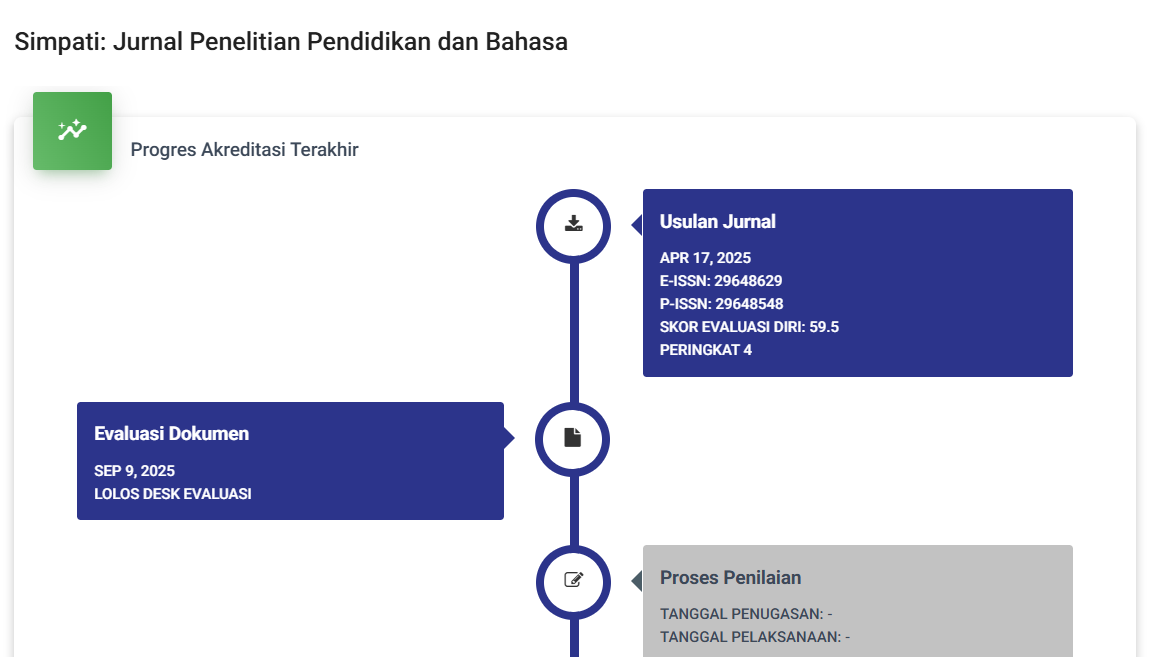Youthful Perspectives In Efl: The First Year Students’ Point Of View On English Subject
DOI:
https://doi.org/10.59024/simpati.v1i4.437Keywords:
English Subject, Students’ Point of ViewAbstract
This study on students’ points of view on English subject was conducted with the first year students at SD 1 Muhammadiyah Banda Aceh. The aim of this study was to address a main question called What are the students’ points of view on English subject?. In addition to this, finding out the students’ point of view on English subject was the aim of this study. The qualitative research employed interviews as the instrument. The interviews were conducted to explore participants’ experiences, perspective, and difficulties regarding the English language. The collected data were analyzed using descriptive analysis. The findings revealed that the majority of students responded positively to the questions. However, students confirmed that English is a challenging subject to learn. In conclusion, the study indicates that students hold a positive point of view on the English subject. The majority of SD 1 Muhammadiyah Banda Aceh first year students have favorable opinions about English subject.
References
• Journal Article with DOI:
Cahyati, S. S., Parmawati, A., & Atmawidjaja, N. S. (2019). Optimizing English teaching and learning process to young learners (a Case Study in Cimahi). Journal Of Educational Experts (JEE), 2(2), 107-114. https://doi.org/10.22460/as.v2i2p147-154.3265
Chen, S., Zhao, J., Ruiter, L., Zhou, J., & Huang, J. (2020). A burden or a boost: The impact of early childhood English learning experience on lower elementary English and Chinese achievement. International Journal of Bilingual Education and Bilingualism, 25, 1212 - 1229. https://doi.org/10.1080/13670050.2020.1749230.
Copland, F., Garton, S., & Burns, A. (2014). Challenges in teaching English to young learners: Global perspectives and local realities. Tesol quarterly, 48(4), 738-762 https://doi.org/10.1002/tesq.148
Djigunovic, J. M. (2009). Impact of learning conditions on young FL learners' motivation. Early learning of modern foreign languages: Processes and outcomes, 75-89. https://doi.org/10.21832/9781847691477-008
Jin, L., Liang, X., Jiang, C., Zhang, J., Yuan, Y., & Xie, Q. (2014). Studying the motivations of Chinese young EFL learners through metaphor analysis. Elt Journal, 68, 286-298. https://doi.org/10.1093/ELT/CCU011
Liu, H., & Brantmeier, C. (2019). “I know English”: Self-assessment of foreign language reading and writing abilities among young Chinese learners of English. System. https://doi.org/10.1016/J.SYSTEM.2018.10.013.
Makubalo, G. (2007). “I don't know… it contradicts”: identity construction and the use of English by high school learners in a desegregated school space. English Academy Review, 24,25-41. https://doi.org/10.1080/10131750701452287.
Muñoz, C. (2014). Exploring young learners' foreign language learning awareness. Language awareness, 23(1-2), 24-40. https://doi.org/10.1080/09658416.2013.863900
Oktaviani, A., & Fauzan, A. (2017). Teachers Perceptions about the Importance of English for Young Learners. , 1, 1-15. https://doi.org/10.31539/leea.v1i1.25.
Resmini, S. (2019). EFL Students’ Perception Towards The Use Of Bahasa Indonesia In An English Classroom. ELTIN Journal: Journal of English Language Teaching in Indonesia, 7(1), 12-22. https://doi.org/10.22460/eltin.v7i1.p12-22
Stakanova, E., & Tolstikhina, E. (2014). Different approaches to teaching English as a foreign language to young learners. Procedia-Social and Behavioral Sciences, 146, 456-460. https://doi.org/10.1016/j.sbspro.2014.08.154
Su, Ya-Chen. (2006). EFL Teachers’ Perceptions of English Language Policy at the Elementary Level in Taiwan, Educational Studies, vol. 32, no.3, pp.265-283, 2006. https://doi.org/10.1080/03055690600631218
Sukmawati, N. N. (2018). Teacher talk in teaching English for young learners. Jurnal VARIDIKA, 30(1), 62-72. https://doi.org/10.23917/varidika.v30i1.6545
Taman, P, et.al (2021). The Young Leraners’ Perception Towards English Instructional Practices Using Virtual Platforms. Journal of Applied Linguistics and Literature. Vol 6. No.2. https://doi.org/10.33369/joall.v6i2.15369
Tin, T.B. (2011). Learning English in the periphery: A view from Myanmar (Burma). Language TeachingResearch, 18, 117 - 95. https://doi.org/10.1177/1362168813505378
Trebits, A., Koch, M. J., Ponto, K., Bruhn, A. C., Adler, M., & Kersten, K. (2022). Cognitive gains and socioeconomic status in early second language acquisition in immersion and EFL learning settings. International Journal of Bilingual Education and Bilingualism, 25(7), 2668-2681. https://doi.org/10.1080/13670050.2021.194330
Yana, Dewi, et al. Students’ and Teachers’ Perception of Learning English for Young Learners. Tamaddun, vol. 21, no. 2, 8 Dec. 2022, pp. 186-197, doi:10.33096/tamaddun.v21i2.207.
• Journal Article Without DOI:
Asmali, M. (2017). Young Learners' Attitudes and Motivation to Learn English. Novitas-ROYAL (Research on Youth and Language), 11(1), 53-68.
Kersten, K. (2002). The acquisition of English verbs in an elementary school immersion program in Germany (pp. 473-497). WVT, Wissenschaftlicher Verlag Trier.
Kersten, K., & Rohde, A. (2013). Teaching English to young learners. Language acquisition and use in multilingual contexts, 107.
Lesia, E. S., Petrus, I., & Eryansyah, E. (2022). Teaching English for Young Learners in Elementary School: Perceptions and Strategies. International Journal of Elementary Education, 6(1), 142-148.
• Book:
Ary, D., Jacobs, L. C., Irvine, C. K. S., & Walker, D. (2018). Introduction to research in education. Cengage Learning.
Crystal, D. (200). Language Death. (Camridge, Cambridge University Press).
Garton, S., & Copland, F. (Eds.). (2018). The Routledge handbook of teaching English to young learners. Routledge.
Moleong, L.J. (2016). Metodologi penelitian kualitatif edisi revisi. Bandung: Remaja Rosdakarya.
Murray, D. E., & Christison, M. (2019). What English language teachers need to know volume I: Understanding learning. Routledge.
Walgito, B. (2010). Pengantar Psikologi umum. Yogyakarta: C.V. Andi.
• Chapter of a Book:
Nunan, D. (2016). Teaching English to young learners. In Handbook of Research in Second Language Teaching and Learning (pp. 68-81). Routledge.
















